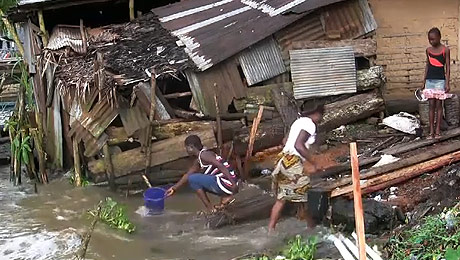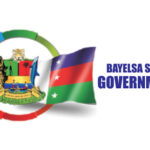The discovery of crude oil in commercial quantity in Oloibiri community of Bayelsa State in 1956 by Shell Petroleum Development Company (SPDC) and its subsequent drilling in 1958 was seen as God’s abundant blessing to the people of the state and the Niger Delta at large, but in recent times residents of the state have decried pollution caused by oil exploration.
Daily Trust gathered that oil spill and gas flaring which are the two “oil curses” on the communities are mostly exacerbated by bunkering and illegal refining.
- NIGERIA DAILY: Cost Of Production Makes Rice Expensive
- Nigeria loses $1.7bn court case against JP Morgan
These illegal activities discharge carbon in form of soot to the environment, making it toxic and uninhabitable.
Residents of the state had previously complained of contracting ailments such as asthma, cholera, among others, over constant pollution of the environment by the activities of multinational oil companies.
Also, findings show that between 2014 and now, Eni, Nigeria’s subsidiary of Nigeria Agip Oil Company (NAOC), has reported over 820 cases of oil spill in the Niger Delta, with about 26,286 barrels of crude oil lost.
Similarly, SPDC recorded over 1,010 cases of spill in the region, aside other spills by oil companies operating in the region.
While the operators always ascribe such incidences to third party interference in their equipment, the host communities on their own claim that the spills are caused by equipment failure and inability of the oil companies to maintain their equipment properly.
But the oil multinationals have declined to comment on the claim by the communities.
Early this year, Agip Oil Company had to declare force majeure at the 25,000 barrel per day (bpd) Brass Oil Export Terminal in Bayelsa State over a blast in the facility by suspected vandals, a situation that made the country risked losing $2.84 daily.
Though, the force majeure was lifted after about a week, according to the oil company, the blast led to a shortfall of 25,000 barrels of crude oil and 13 million standard cubic metres of gas per day from the terminal.
Currently, Nigeria is ranked among the top 10 countries of the world with the largest proven deposits of natural gas. However, it flares much more than the combined energy needs of sub-Saharan Africa in a day. This phenomenon has brought socio-economic losses and health related problems to the Niger Delta and its people.
A resident of Imiringi community, Godspower Samuel, told Daily Trust that the community had several SPDC facilities, including 46 oil wells and five flaring, but that the worrisome situation among the locals was the negative effects the facilities had on the community, saying that issues ranging from health hazards to water and air pollution were all caused by contamination from oil exploration activities.
He further said materials used for roofing easily got rusted, and that based on research by the Nigeria Centre for Disease Control (NCDC), flaring activities were estimated to be the prime cause of 4,960 respiratory illnesses among children, noting that over 120,000 of the children were afflicted with asthma on yearly basis in the Niger Delta.
Daily Trust findings also revealed that some life threatening diseases such as cholera, malaria, cataract, conjunctivitis and respiratory tract infections are associated with gas flaring and oil spill because most times the sources of potable water are contaminated due to the spillage, while gas flaring pollutes the airspace.
A fisherman in Ayama-Iyaw community, David Ebiere, lamented that the incessant oil spills had left them with no means of survival as nearly all the fish had been killed.
Recently, the leadership of Lasukugbene community in Southern Ijaw LGA of Bayelsa State slammed the multinational oil company and the state government for abandoning the community four months after a major oil spill was reported at the Tedibaba-Brass trunk line operated by Nigeria Agip Oil Company (NAOC).
Also, during a follow up visit to the community and spill site by the Environmental Rights Action (ERA) last week, the spill site remained polluted.
The paramount ruler of the community, Chief Farnen Akinaka, and the Community Development Committee (CDC) Chairman, Mr Innocent Oputa, expressed dissatisfaction that since the spill was reported on February 3, Agip had neither carried out a cleanup nor sent relief materials to the people.
Chief Akinaka said, “Since this spill occurred my people have been suffering. There is nothing whatsoever in terms of relief materials sent to this community either by Agip or the Bayelsa State Government. Our people are getting sick; our fishermen can no longer go fishing, our women can no longer go to the farm because of the heavy presence of crude oil.
“We are appealing for urgent intervention from the authorities.”
A community leader, Mr Kiente Zion, said it was shameful and insensitive for the state government and Agip to treat the Lasukugbene oil spill with levity despite the health and environmental hazards it had exposed the people of the community to, describing as a scam a purported clampdown of the spill site by Agip.
He said, “It is awful when you look at things like this, since February 3, when this spill was reported, nothing has been done for the people concerning it.
“The best that NAOC has done is to come and clampdown the spill, but up till now, Agip has not come to the community to identify with the people, not even the state government, and it is a pain that we have a system that does not care about the people. If the government does not identify with the people, what will the multinational do?
“The purported cleanup is a scam because by procedural standards you are not supposed to do cleanup without relief materials to the affected community, and Agip are good in doing things like this because the government allows them.”
The immediate past administration in the state constituted an international commission of inquiry headed by the Archbishop of York, United Kingdom, Dr John Sentamu, to assess the level of environmental damage due to the activities of oil exploration, and the findings indicted the multinational oil companies as being responsible for the pollution in the Niger Delta.
But the multinational oil companies could not be reached to respond to the allegations against them.
However, oil thieves are also part of the problem. Last month, vandals blew up the 24-inch Ogboinbiri/OB-OB gas pipeline operated by Agip Oil Company at Azikoro /Okaka communities in Yenagoa and spilled oil thereby causing a major pollution.
Bayelsa State Commissioner for Environment, Mr Iselema Gbaranbiri, while speaking with journalists in his office recently, called on all stakeholders to complement the effort of the state government in the fight against environmental damage occasioned by oil exploration activities.
He said the level of damage caused by oil spill and other environmental pollutants could not be underestimated, adding that it destroyed both aquatic and terrestrial life to the detriment of humanity.
He also stated that studies had shown that they were responsible for the prevailing cases of cancer, respiratory and dermatological illnesses, among others, as it also affected food security with the ecosystem badly wounded.
According to him, there are enough evidences that over 80 per cent of Joint Investigation Visits (JIV) to oil spill sites show that they are caused by equipment failure.
He, however, stated that the state government was working assiduously to take up remediation measures such as afforestation, noting that as a matter of state policy, property developers had been asked to build green areas in their development plans to absorb enough carbon dioxide for the purification of the air and safety of the people.

 Join Daily Trust WhatsApp Community For Quick Access To News and Happenings Around You.
Join Daily Trust WhatsApp Community For Quick Access To News and Happenings Around You.

